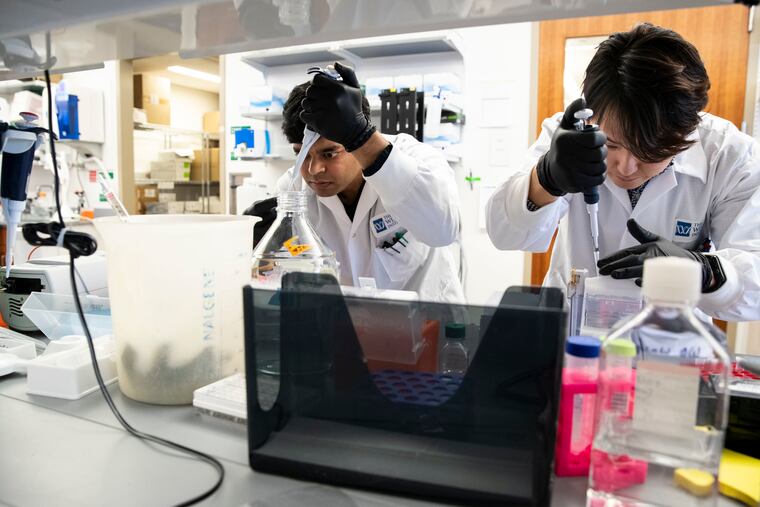Progress reported for coronavirus vaccines from Jefferson and Wistar, skepticism about Moderna
Coronavirus vaccine development is racing ahead. Only time will tell what really works.

Around the world, more than 100 coronavirus vaccine candidates are in development, as the need for a pandemic panacea grows ever more desperate.
Here are updates from three promising experimental immunizations — two with Philadelphia roots.
An important partnership
Thomas Jefferson University on Wednesday announced it has signed an exclusive deal with the global vaccine manufacturer Bharat Biotech to develop a coronavirus immunization invented at Jefferson.
The novel vaccine uses an existing rabies vaccine as a carrier to deliver coronavirus spike proteins that it is hoped will trigger an immune response. The rabies vaccine has a long, successful track record and is approved for the whole population, including children and pregnant women. It also can be dehydrated and stored without refrigeration, making it ideal for use in developing countries.
Under the license agreement, Bharat Biotech, headquartered in Hyderabad, India, gains rights to market Jefferson’s vaccine except in certain countries, including the United States, where Jefferson continues to seek partners. With support from the Indian government, Bharat Biotech aims to start human trials of Jefferson’s invention as soon as December.
» FAQ: Your coronavirus questions, answered.
"Our partnership with Bharat Biotech will accelerate our vaccine candidate through the next phases of development,” said microbiologist Matthias Schnell, who directs the Jefferson Vaccine Institute. “We will be able to complete animal testing and move to a phase 1 clinical trial [in humans] rapidly.”
Bharat says it has delivered more than four billion doses of vaccines to the world, including for H1N1 flu, rotavirus, Zika, and typhoid disease.
Preliminary signs of effectiveness
The Wistar Institute in Philadelphia on Wednesday announced that an animal study of its experimental vaccine showed signs of prompting an immune response, namely the production of antibodies and the activation of T cells.
The vaccine, being developed with Inovio Pharmaceuticals of Plymouth Meeting, uses a DNA plasmid — a tiny package of genetic instructions — that is inserted into skin cells. The cells then make a fragment of the coronavirus, which triggers the immune response. Many DNA vaccines are in the research pipeline, but none have yet been approved.
» READ MORE: Why a coronavirus vaccine will take 18 months
The Wistar vaccine is already in the first phase of human testing, but the researchers are continuing to study its performance in animals.
The new study, published in Nature Communications, showed that mice and guinea pigs responded to a single immunization within days, producing antibodies that neutralize the coronavirus and marshaling T cells.
Skepticism sets in
Moderna’s stock valuation soared Monday when the company announced that its vaccine candidate, the front-runner in the United States, seemed to have generated an immune response in the first phase of human testing.
But the Cambridge, Mass.-based company disclosed very few data, prompting questions about whether the results were as strong as the media blitz.
STAT News interviewed experts who pointed out that the National Institute for Allergy and Infectious Diseases, which is partnering with Moderna on this vaccine, did not issue a news release and would not comment on Moderna’s announcement.
What’s more, while Moderna said all 45 volunteers developed antibodies, it had more detailed data for only eight of them. Those eight developed neutralizing antibodies, the most powerful type. Whether the 37 other subjects also develop neutralizing antibodies remains to be seen.
Moderna told STAT that more data will be disclosed in a journal article that NIAID eventually will publish.